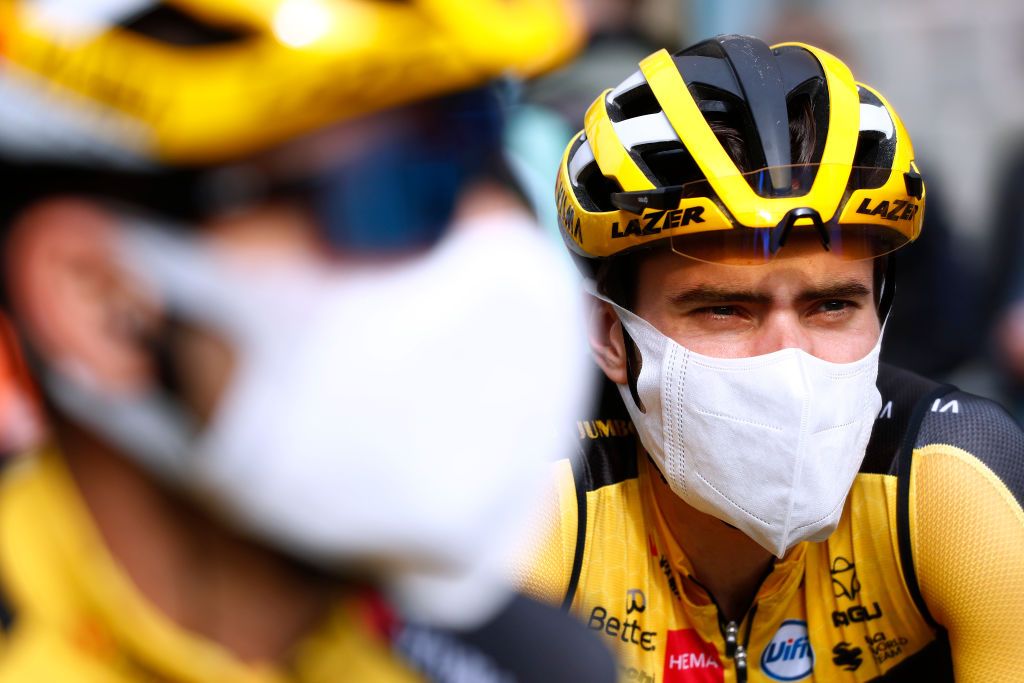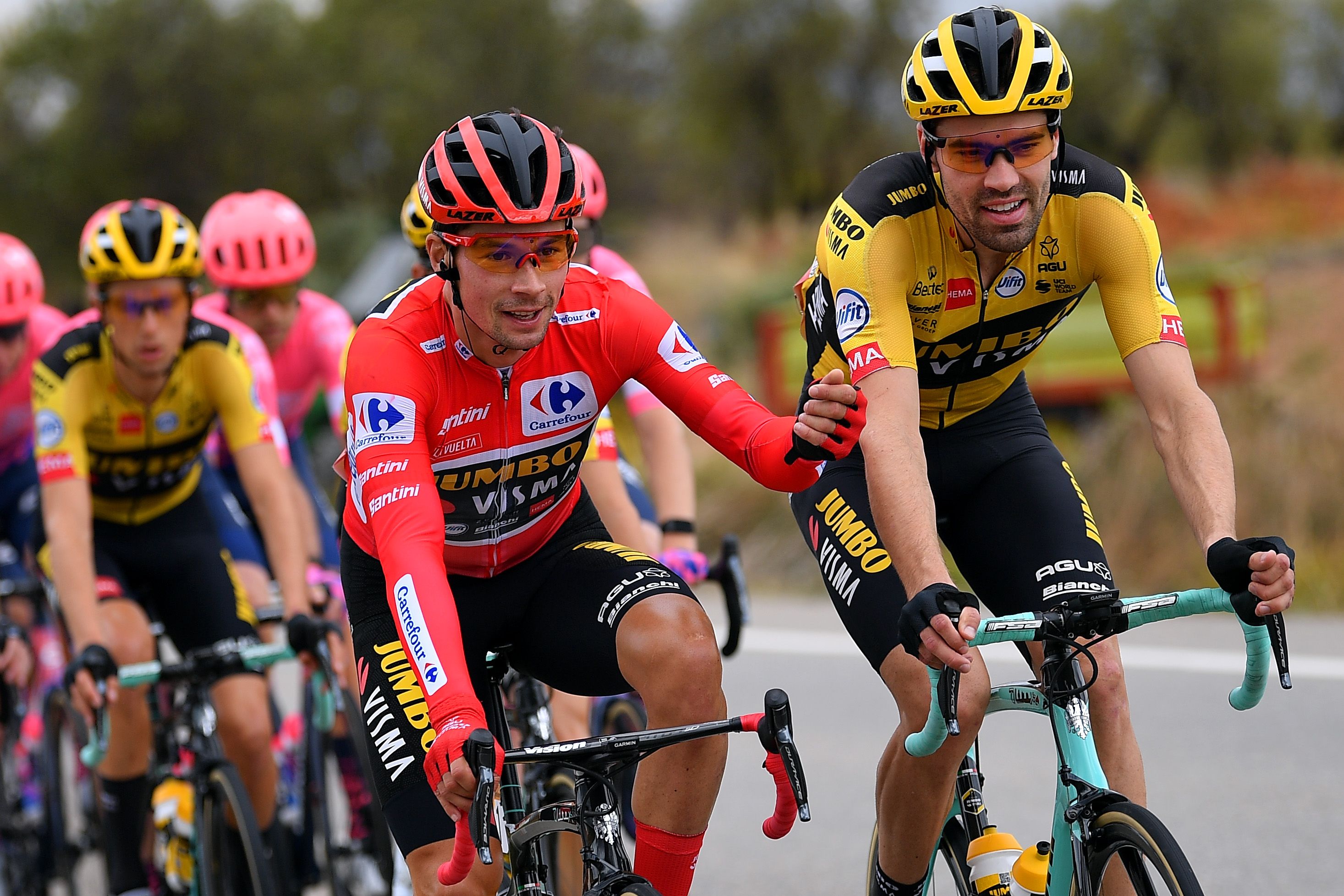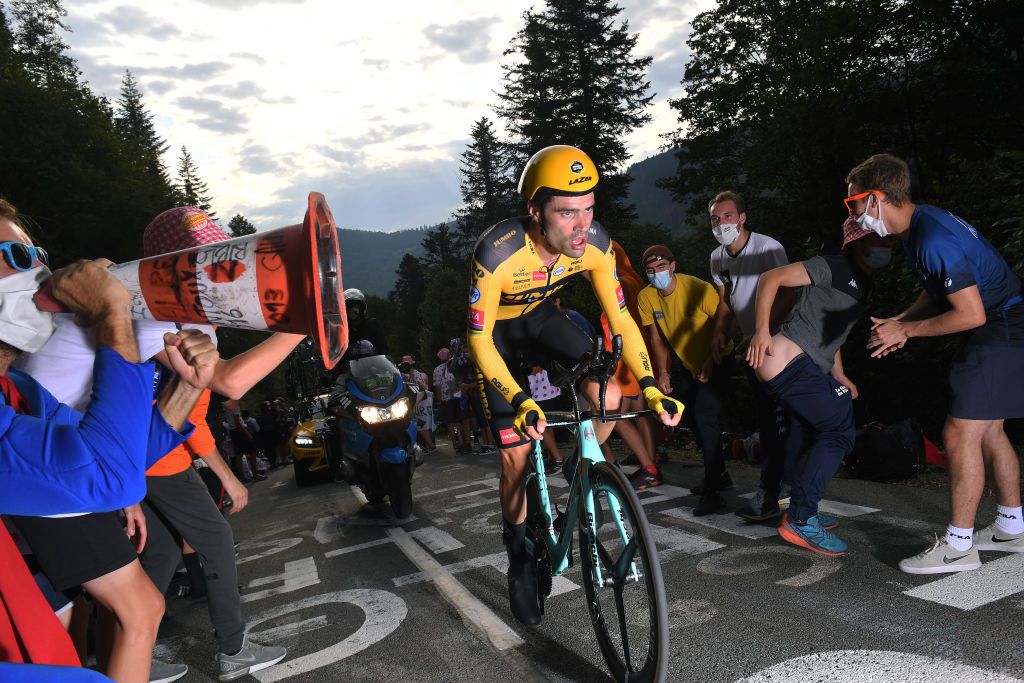Why We Should Celebrate Tom Dumoulin’s Break From Pro Cycling
The news that Tom Dumoulin was taking an immediate and undisclosed-length break has rocked cycling fans, and poses some serious questions.
Has Tom Dumoulin really taken a break from entertaining cycling fans so richly? On Friday, January 22, I paced around in my kitchen listening to the special edition of The Cycling Podcast, recorded at the Team Jumbo Visma training camp in Alicante, Spain. In one of the interviews, Tom Dumoulin tells Richard Moore how he’s looking forward to riding the cobbled classics with Wout van Aert.
“I mentioned to Merijn Zeeman, ah, I want to do cobbled classics, that it would be really nice. I always loved riding the cobbles and also if there’s a Roubaix stage in the Tour, I’m always excited about it. I think I’m one of the only GC riders who is actually excited and not afraid … Obviously I’m disappointed about missing the Ardennes classics but I’m getting really really excited about doing, for example, Ronde van Vlaanderen.”
The interview is interspersed with laughter and cheer, which is a relief to hear considering the rough few years Dumoulin has had since his disappointing crash in the 2019 Giro d’Italia, and his subsequent injury and departure from Team Sunweb. Though his first season with Jumbo Visma in 2020 presented mixed results, things seemed to be finally looking up for Dumoulin.
Then, the next day, a bombshell: Dumoulin announces his immediate, indefinite departure from cycling.
“I have been doubting for quite some time, months, maybe even a year, how I should find my way as Tom Dumoulin the cyclist,” he said in the video. “The pressure, the expectations from different parties, I just want to do well for the team, for the sponsors, for my wife, for my family. I want to do well for everybody but over the course of doing that I kind of forgot myself.”
He continues: “What do I want, and what does the human being Tom Dumoulin want with his career? The question that has been stirring inside of me for several months really deep that I have never gotten the time to really think about life as a pro cyclist just continues, we are on a fast train.”
At first, the decision came as a shock to the cycling world, a total 180 from the podcast interviews released the day before, in which he sounded so optimistic and excited to race in the upcoming season. But in the video announcing his departure, Dumoulin looks happy, the light of life back in his eyes. It is the expression of someone who has just lifted a burden from their shoulders.
In retrospect, the writing was on the wall for quite a long time.
The decision for a professional cyclist at Dumoulin’s level to walk away from the sport is not unheard of (Marcel Kittel’s soul-searching in 2019 ended in permanent retirement), but it is rare. However, Dumoulin’s struggle with managing life as a professional athlete is nothing new. Even as early as 2018, Dumoulin talked about falling out of love with cycling: “Last autumn, all the peripheral things started to distract me, and I lost sight of the beauty of my sport,” he told De Telegraaf. “I only saw the disadvantages that I was suddenly confronted with … I wasn’t comfortable with myself. That caused so much imbalance that I constantly collided with myself. It sounds very intense now, but it was a period in which I have really struggled with myself.”
Tom Dumoulin has always been a thinking person’s cyclist. A deeply intelligent man with a disposition ranging from cocky to introspective, he is beloved for his way with words, his openness, and his complexity. The first Dutch winner of the Giro d’Italia, a World Champion time trialist, and second-place finisher in both the Olympics and the Tour de France, Dumoulin’s palmares are nothing at which to scoff.
However, unlike most athletes of his caliber who seem put on this earth for sport and sport alone, one always got the impression that Dumoulin didn’t have to be a cyclist, that he could have done many other things with his life. Indeed he almost did—at first, he wanted to follow in the footsteps of his father and become a doctor, even studying Health Sciences at the university in Maastricht; though after he completed his studies, he wasn’t chosen to pursue the path further and hence, became a professional cyclist.
The subject of medicine is a recurring theme in Dumoulin’s interviews. In a particularly poignant one in Soigneur, he said, “I find it odd when people cheer for me, because I don’t think that what I do is so special. It’s more what other people make of it. For me, a doctor who saves a life does something really special, but no one stands to cheer for him.”
Dumoulin’s self-doubt is a constant thread woven into the way he talks about cycling, and this has served to humanise him. All cyclists are engaged in epic literary battles—man versus man versus nature versus machine—but Tom always added an extra element to the story, the conflict of man versus self. This very open struggle is why I have always gravitated towards him as an athlete; indeed, it is why I have a signed jersey of his hung in my bike room to serve as motivation. If Tom can overcome his feelings of inadequacy and recover from injury, I can certainly get up this stupid hill in Zwift.
However, ever since the Soigneur interview, something hasn’t sat right with me, and I got the distinct sense that Dumoulin has been struggling mentally, despite his change of pace at Jumbo Visma. This was cemented upon watching the footage of Dumoulin in tears on the team bus in the latest documentary about Jumbo Visma, Code Geel, something he blamed on saddle sores. Replaying that segment, it is clear that one is witnessing a man who has reached his emotional breaking point. It is heartbreaking.
For all intents and purposes, Jumbo Visma, as a team, has handled Dumoulin’s departure about as best as a team can, although it would have been nicer if Dumoulin had been placed on paid rather than unpaid leave. Merijn Zeeman, directeur sportif, revealed in a video about the departure that Tom had been seeing a sports psychologist for some time, as did most athletes on the team.
“We gave Tom all the help he needed already from the last season. In the end, the same question kept coming up, and in close consultation with us, he decided to take a break to come back to his senses,” Zeeman said. “We got Tom professional help, we worked very hard on that. In that process ‘I don’t know if i still want it’ was an outcome. In the end, it’s Tom’s decision and we support him in that.”
What do you think? 🗣
Athletes and sports directors being open and public about their mental health and the support they seek helps to destigmatise not only treatment but also the very act of being open about one’s struggles. Historically, that has been repressed in a sport like cycling, which is still wrapped up in machismo and narratives of dominance and sublimation of the self.
We so often forget that athletes are, in fact, human beings, as rich and complex as any others, and Tom Dumoulin, both in his prior interviews and in his decision to walk away, reminds us of this. Dumoulin had the courage to ask himself some of the most frightening, existential questions we humans can possibly ask ourselves: if he is happy, and why he is alive on this earth—something most of us, athletes or not, never have the courage to do and suffer because of it.
And he has answered them. He is not happy, and he needs some time to find out who he is. Dumoulin cites the pressure to succeed and do right by his team, the sponsors and the fans as a major reason for his decision. This invites us, as consumers of sport, to take some time to ask questions of ourselves, too.
In the age of social media, we have unprecedented access to the lives of athletes and other public figures, and while this has added some transparency to a sport that’s traditionally rather opaque, it has also invited a culture of abuse and entitlement. On social media, everyone’s a critic. But even outside of social media, imagine how it feels to be Tom Dumoulin, doing his best to recover from injury and illness, only to be berated with endless hot takes about whether or not he’ll ever move on beyond Jumbo Visma domestique duty, whether he’ll ever be in top form again, whether he’ll ever contort his body into whatever it needs to be to get up this hill or win that grand tour. Imagine having your life and your body litigated and relitigated in such a public way. Beyond that, imagine winning a grand tour and, instead of that accomplishment (which in itself is an incredible feat of endurance and athletic prowess) being celebrated for what it is, being pressured to immediately repeat the performance a year after, and the year after that.
Frankly, we, the fans, should not expect such things of cyclists in the modern era, an era that, while doping almost inevitably continues behind closed doors, is still the cleanest the sport has been since mid-century. The time of superhuman performances is no longer with us. The current stars win at much narrower margins, relying more on teamwork and strategy rather than feats of pure individual strength. Results-wise, the generation of cyclists Dumoulin belongs to (which also includes Wilco Kelderman, Thibaut Pinot, and Romain Bardet among others) seems downright unlucky compared to the two generations prior to them, when, in reality, they are competing in a changed sport. Our expectations should, in turn, change with it.
Dumoulin did not walk away because he could not handle being a professional cyclist. He walked away because the world of cycling made his life unbearable to the point where joy and self-fulfillment eluded him. As members of that world, we should use this time to reflect not on what Tom could or couldn’t accomplish, but on what role we as commentators, fans, and spectators play in the lives of people we forget have souls and desires and emotions as rich and complex as our own.
Godspeed, Tom Dumoulin. I hope you find what you’re looking for.
Kate Wagner is an architectural and cultural critic whose writing can be found in a variety of publications including The New Republic, The Baffler, and The Atlantic. She rides, with utter devotion, a 2000 Bianchi Volpe.
READ MORE ON: dumoulin pro racing worldtour




